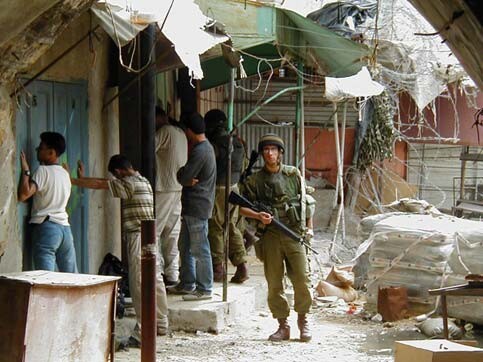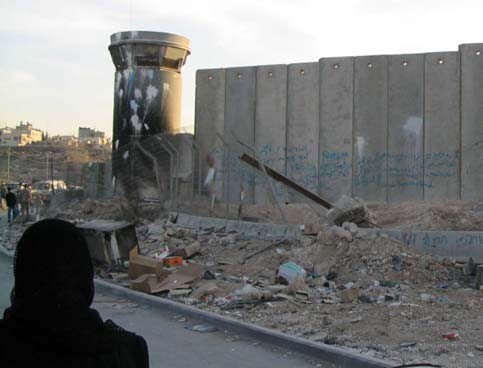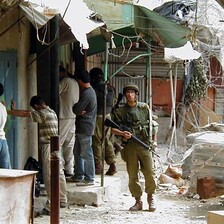
Israeli soldiers check the IDs of young Palestinians in Hebron’s Old City (Photo: Christian Peacemaker Teams)
23 October 2004
I woke up at 6:30am to do a morning school patrol; we basically walk
around the Old City and make sure Palestinian children are allowed to get
to school unhindered by Israeli soldiers and settlers. Fortunately, this
isn’t as big of a problem in Al Khalil (Hebron) as it is in Tuwani, but it
is good for us to keep an eye out. At 8:30 we had team worship, which is
organized by a different team member each day. Today it consisted of a
Bible reading from the Beatitudes, time of silence for reflection, a little discussion and sharing of thoughts, and then a song. Afterwards, we had a team meeting and worked out the days activities including a visit to Beit Umar, a village in the hills just north of Al Khalil.
I decided to get a hair cut and shave from a local barber before we left.
On my way, I came upon a large group of settler men, women, and children
taking a casual stroll through the old city, escorted by a half dozen
heavily armed soldiers. Settlers don’t usually walk through that area, as
it is designated for Palestinians, so this was clearly a provocative
showing of power. I called for reinforcements, and followed the group
until they were all safely away to the near-by settlement. Afterwards,
soldiers detained a dozen men and a couple of women trying to just pass
through the market. They held them for about 35 minutes and then finally
let them go. I went and got my haircut, and it turns out the barber also
does the call to prayer at the near-by Mosque, so I had to wait a few
minutes while he went and sang over the loud speaker.
Shaved and shorn, I headed up to visit the Jamal and Sa’diyya Miqbul
family in Beit Umar. They live on a beautiful hillside with a gorgeous
view, but Israel has built a settlement remarkably close to their house,
and they rightfully worry that Israel may expand the settlement and force
them to move. Israel put a demolition order on their home in April of
2000, and they sometimes fly helicopters over their roof, causing so much
stress and fear that Sa’diyya once had a miscarriage. Like most
Palestinian men, Jamal has been shot, beaten repeatedly, and arrested
three times. Jamal’s family are refugees in Beit Umar; in 1948 they were
forced to leave “Iraaq el Munshiya”, their small village near Ashkelon in
what is now Israel. Now he works as a barber, but for many years he worked
in construction, a tragic irony given the potential fate of his home. Even
more tragic, he used to work in Israel, building homes for Jewish
immigrants on former-Palestinian land, and even built homes for strangers
in his former village. He said that each day he brought home bags of dirt
he took from the land stolen from his family, and his mother used it to
plant a garden, a small but symbolic way to preserve the remnants of their
rightful home. Jamal is part of CPT’s “campaign for secure dwellings”
which pairs North American families and churches with Palestinians whose
homes may be destroyed. Check out CPT’s website for more info on
that campaign.
After the visit, we set off for Al Quds (Jerusalem), just in time to break
the Ramadan fast in the Old City; plenty of festive eating, drinking and
prayer. During Ramadan, Muslims fast from sunup to sundown for thirty
days. The day-time self-denial represents solidarity with the poor, and
the celebratory feasting after dark represents the charity and good will
we must have for the less fortunate. It started a week ago and goes until
mid-November this year. It’s celebrated at the same time on the lunar
calendar that Allah revealed the Quran to Mohammad during his “Night of
Power”. I fasted for the first day, and I may do so for the whole last
week.
After the celebrating in the Old City died down, we hung out in the Faisal
Hostel, the local hangout for members of the International Solidarity
Movement (ISM), the group with whom I worked last time I was in Palestine.
We smoked Nargilla (one of many names for the tall water pipe out of which
one smokes flavored tobacco, also known as a Shisha, Hookah, and Hubbly
Bubbly), drank wine, and exchanged West Bank war stories. A few Swedes
told a particularly disturbing story about soldiers attacking a group of
ISMers harvesting olives. The soldiers tried to arrest the Palestinian ISM
coordinator, but internationals piled on top of him and prevented the
soldiers from taking him. The soldiers proceeded to beat the
internationals with the backs of their guns, and even choked some and
lifted them by their ears and noses, but in the end no one was arrested.
You can read a full account at www.palsolidarity.org.
I met up with a Palestinian American friend of mine from Iowa who’s
working for cultural center in Bethlehem. His family is from Ramallah
(refugees there actually), and they run an ice cream shop, so we headed up
there for a visit. We crashed on the couches of a British friend of his.

Turnstiles at the Qulandia checkpoint make passing through difficult and humiliating. (Photo: Joe Carr/Christian Peacemaker Teams)
24 October 2004
Between the major Palestinian cities of Al Quds (Jerusalem) and Ramallah,
Israel has constructed a mega checkpoint named after the village Israel
destroyed to build it, “Qalandia”. In Al-Ram, the village just south of the
Qalandia monstrosity, Israel has built their Wall right down the middle of
the main street. They have destroyed the side of the road that led south
into Jerusalem, sending the message that Jerusalem is no longer a
Palestinian city, it belongs Israel now. Now both directions of traffic share the one lane on the east side of the wall, effectively creating a pot-holed traffic jam from hell.
Qalandia consists of multiple guard towers, huge fences and walls, and a
complicated series of metal-detectors, turnstiles, and cattle shoots.
Imagine trying to get children, a stroller, or a walker through those grated turnstiles like you see in the New York subway. Not to mention the
humiliation of being made to wait like cattle at the mercy of some
18-year-old with total power over whether to let you in or out, make you
wait for hours, or arrest or beat you. When I went through, things were
running more smoothly thanks in part to the presence of Machsom (checkpoint) Watch, a group of older Jewish Israeli women who try and keep soldiers from misbehaving at checkpoints. To see more of the pictures I took of this eyesore, click here.
Once through Qalandia, I took a cheap cab into the center of Ramallah.
Ramallah (which means “Hills of God” in Arabic) is now the capitol city of Palestine as Israel has annexed East Jerusalem. Ramallah is the headquarters of the Palestinian Authority (or what’s left of it), where Yasser Arafat is kept on house arrest in his compound. The city is a hubbub of western activity; evidence of internationals and the culture they bring with them is present everywhere. The city is also home to a small but significant percentage of Palestinian Christians, and since it was Sunday, my friend and I decided to go to church. We attended the Ramallah Quaker meeting, one of three Quaker meetings in all the Middle East. Before the silence began, the director explained to us why we were meeting in a classroom of a school rather than in their historic meetinghouse. Israeli soldiers reportedly invaded the meetinghouse, turned it into a war zone, and destroyed everything inside, including one entire wall. The Ramallah Quakers couldn’t afford to restore it and were planning to sell, but the Palestinian Authority declared it a historical site, making it illegal to sell it. Thanks to a few US Quaker meetings
(especially one in Philadelphia), they are now renovating the meetinghouse
and it should be open soon. It was wonderful to have an hour of collective
silent meditation and prayer in the midst of this conflict.

The wall and guard tower at Qulandia checkpoint, which separates Ramallah from Al Quds (Jerusalem). Palestinian activists regularly throw paint bombs at the towers and soldiers as acts of resistance. (Photo: Joe Carr/Christian Peacemaker Teams
In addition to the Christian contingent, many of the Muslims in Ramallah
are secular; combine this with a load of young western liberals, and you get the Las Vegas of Palestine. Birzeit University is located just north of the city, and it is quite the college atmosphere. Bir Zeit in Arabic means “Wells of Olive Oil”, but in German it means “Beer Time”, and this is a more fitting description. Restaurants and bars line the streets, and young internationals and Palestinians wander around raising hell. It is here where the idea of throwing paint bombs at Israeli soldiers arose. Now one can frequently see Israeli jeeps driving by covered in bright pink paint, and no guard tower has escaped colorization by mischievous shebab (youth).
The Ramallah shebab are not only proud of their resistance to the Israelis, but also brag of being independent from the Palestinian Authority and the Muslim hierarchy, hence our ability to drink beer on the street at one o’clock in the afternoon during Ramadan. One shebab told me a story of a time when the Al-Aqsa Martyrs Brigade declared a general strike because one of their leaders was killed; they drove through Bir Zeit village announcing on a loud speaker that everyone must close, and a group of shebab jumped them, “slapped them around”, and forced them to drive through the town announcing a retraction.
My comrade hit the table with laugher as he told this story, and we all
suddenly noticed the bubbles of carbon dioxide rising quickly from the
bottom of his beer to the top, becoming frothy white foam. We all sat and
stared, mesmerized for a few moments, and it made me think about
Palestinian resistance. Individuals, rising up together, create something
seemingly separate from the whole, but are truly an essential part of the
fizzy beverage that is society. I know it’s a corny metaphor, but imagine
it after a couple of beers. May the Palestinians all have their chance to
drink and be merry free from oppression; I wait anxiously for my chance to
join the froth.
Joe Carr is a 23-year-old peace activist from Kansas City, Missouri. He
has worked Earth First, Food Not Bombs, and Arts in Activism. In 2003,
he coordinated for the International Solidarity Movement in Rafah,
Palestine, and witnessed Israeli soldiers murder US peace activist
Rachel Corrie, and British peace activist Tom Hurndall. He now works
with the Christian Peacemaker Teams in Al Khalil (Hebron), Palestine and
in the US Palestinian Rights Movement.




